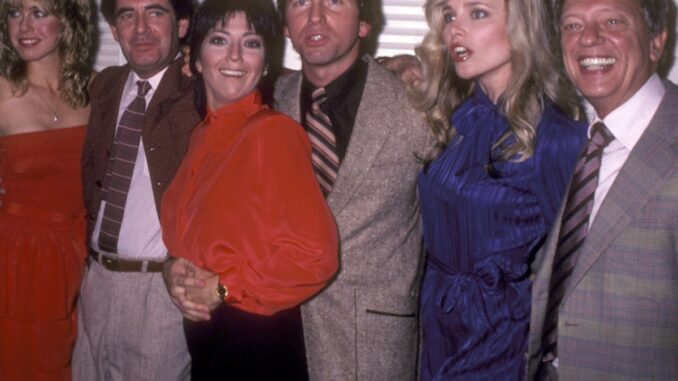
“Three’s Company” is a beloved sitcom that left an indelible mark on television history, and at the heart of its charm was Chrissy Snow, played by the legendary Suzanne Somers. Recently, Suzanne Somers revisited her iconic role, calling Chrissy Snow a feminist in her own right. This bold statement sparked conversations across social media, reshaping how audiences perceive one of TV’s most memorable characters. But how exactly does Chrissy Snow fit the feminist mold? Let’s dive in.
H1: Chrissy Snow – The Feminist in Disguise
Despite her ditzy persona, Chrissy Snow was more than just comic relief. Suzanne Somers believes her character embodied feminist ideals in subtle yet impactful ways. How? Let’s unpack the layers.
H2: Breaking Stereotypes Through Comedy
H3: Subverting the “Dumb Blonde” Trope
Chrissy Snow was often written off as a “dumb blonde,” but she redefined the trope. Her character wasn’t about stupidity—it was about seeing the world with childlike wonder.
Chrissy’s innocence and honesty allowed her to approach situations with authenticity, making her stand out in a world of cynicism. She reminded audiences that intelligence isn’t one-dimensional.
H3: A Strong Voice in a Male-Dominated Apartment
Living with two male roommates, Chrissy held her own. Whether it was Jack’s antics or Janet’s plans, Chrissy’s perspective often added a fresh, humorous layer to the plot, proving she wasn’t just along for the ride—she was steering the ship in her own way.
H2: Feminism in the 70s – Context Matters
H3: The Era of Change
The 1970s was a time of massive cultural shifts. Women were fighting for equal rights, and television was beginning to reflect these societal changes. In this context, Chrissy Snow’s character became a subtle yet powerful feminist statement.
H3: Redefining Female Characters on TV
Before “Three’s Company,” many female TV characters were either housewives or secretaries. Chrissy Snow showed that women could be independent, funny, and unapologetically themselves.
H2: Suzanne Somers’ Vision for Chrissy Snow
H3: A Conscious Portrayal
Suzanne Somers wasn’t just playing a role; she brought intentionality to Chrissy’s character. By leaning into Chrissy’s quirks, she created a multi-dimensional character that resonated with audiences beyond surface-level laughs.
H2: Feminism in Comedy – A Delicate Balance
H3: Humor as a Tool for Social Commentary
Chrissy’s humor was never at her expense. Instead, it was a mirror to society, subtly highlighting the absurdity of certain norms and expectations.
H3: Empowering Through Laughter
What made Chrissy truly feminist was her ability to empower others through her humor. She made people laugh, but she also made them think—an underrated form of activism.
H2: Lessons Modern TV Can Learn from Chrissy Snow
H3: Complex Female Characters Are Timeless
Even decades later, Chrissy Snow remains a relatable figure. Her character reminds us that feminism isn’t just about breaking rules—it’s about rewriting them with a smile.
H3: Embracing Flaws as Strengths
Chrissy’s imperfections made her relatable and lovable. Modern TV can take a page from her book, focusing on characters who are real, flawed, and utterly captivating.
H2: Audience Reactions to Suzanne Somers’ Statement
H3: Sparking a Debate
When Suzanne Somers called Chrissy Snow a feminist, fans and critics alike took to social media. While some were surprised, others wholeheartedly agreed, praising Somers for shining a new light on an old favorite.
H3: A New Appreciation for Chrissy Snow
For many, Somers’ statement was a revelation, prompting a rewatch of “Three’s Company” with fresh eyes. It’s clear that Chrissy’s impact goes far beyond comedic timing.
H2: Chrissy Snow’s Legacy – More Than Meets the Eye
Chrissy Snow wasn’t just a character; she was a movement. Through Suzanne Somers’ portrayal, she taught audiences that being yourself is the ultimate act of feminism.
Conclusion
Chrissy Snow may have been a comedic character, but her impact was anything but trivial. Suzanne Somers’ assertion that Chrissy was a feminist challenges us to look beyond stereotypes and appreciate the subtle ways characters can influence society. In a world that often underestimates the power of humor, Chrissy Snow stands as a testament to the strength of authenticity and individuality.
FAQs
1. Why did Suzanne Somers call Chrissy Snow a feminist?
Suzanne Somers believes that Chrissy’s honesty, independence, and ability to break stereotypes made her a feminist icon in a subtle yet powerful way.
2. How did Chrissy Snow challenge traditional gender roles?
Chrissy lived independently, held her own in a male-dominated space, and used humor to address societal norms, all while staying true to herself.
3. Was Chrissy Snow intentionally written as a feminist character?
While the writers may not have explicitly intended it, Suzanne Somers’ portrayal added depth and feminist undertones to Chrissy’s character.
4. How has Chrissy Snow influenced modern TV characters?
Chrissy paved the way for complex, flawed, and relatable female characters, showing that authenticity resonates with audiences.
5. What’s the significance of humor in feminism?
Humor can break down barriers, challenge stereotypes, and empower people—all of which Chrissy Snow accomplished effortlessly.
